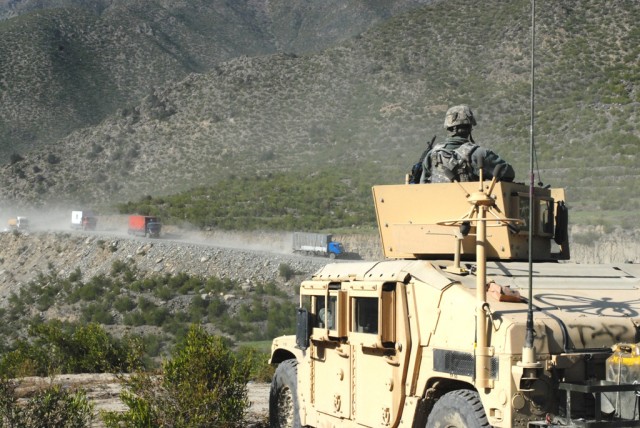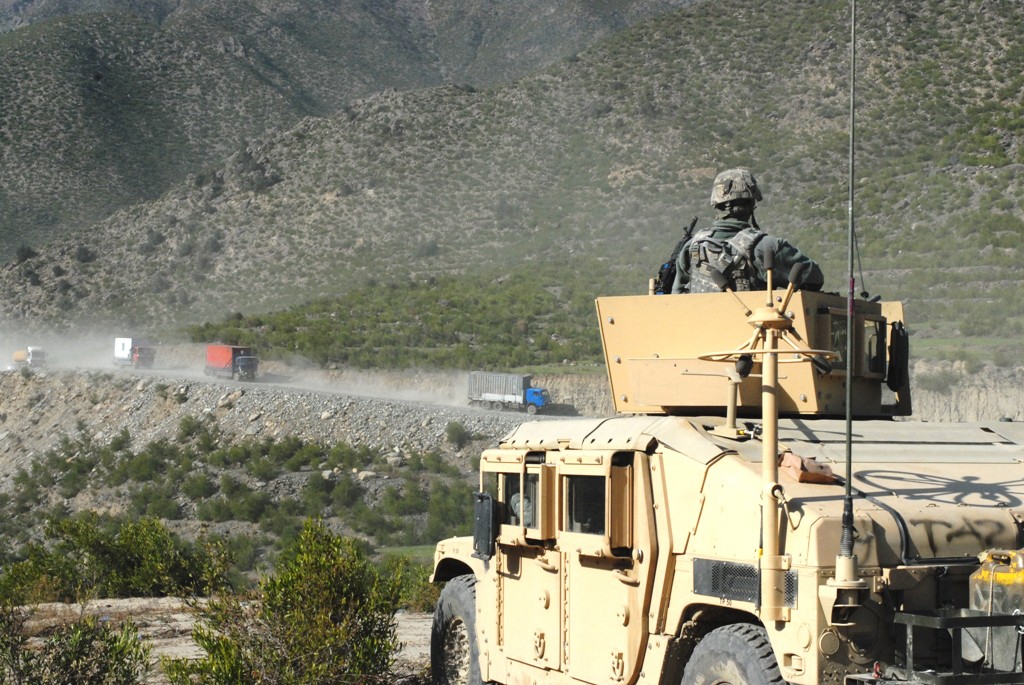WASHINGTON, D.C. (Army News Service, June 23, 2010) -- Army and DoD officials told a Congressional committee Tuesday about what they are doing in Afghanistan to keep contracting funds out of the hands of the Taliban and other criminals.
They testified at a hearing of the House Oversight and Government Reform national security and foreign affairs subcommittee that is investigating whether funds from the Host Nation Trucking contract in Afghanistan could have been paid to insurgents.
The Host Nation Trucking contract totals $2.16 billion and is divided between eight Afghan, American and Middle Eastern companies. A portion of that money goes toward private security guards, and private firms in turn have paid local groups for "safe passage," according to allegations.
Brig. Gen. John Nicholson, director of the Pakistan-Afghanistan coordination cell, said the Army would like to reach a point where private security contracts are unnecessary. Any armed force that is not a part of the Afghanistan government needs to eventually dissolve, he said.
Nicholson said the Afghan National Army and police have recruited a larger force, but do not yet have the necessary training to enable the elimination of private security guards in the country.
"We're going to be able to partner with the police units and increase accountability and increase their professional standards," Nicholson said.
Gary Motsek, assistant deputy under secretary of Defense, commented on the investigation into allegations that contracting funds were paid to insurgents.
"We may not have gotten to a level of evidence that permits us to do something in every case..." he said about investigating the alleged payments.
Motsek was a part-time police officer in New Jersey at one point. "If I were a cop on the other side, I'd say... 'I'm doing what I can with what I got.'"
The Army holds contractors to a certain ethical standard said Lt. Gen. William Phillips, principal military deputy to the assistant secretary of the Army for Acquisition, Logistics and Technology. He explained several ways that contracting officers are trained in ethics.
Phillips said the Army is making contracting improvements, especially with subcontractor management. A new clause will go into contracts to provide "greater visibility into subcontractors ... It would give us greater visibility into banking and financial efforts."
Not all of the committee's comments were critical of contractors. John Tierney, chair for the subcommittee, wrote in his submitted statement, "To their credit, many of the contractors immediately recognized that they could not adequately procure, manage, or oversee mass-scale security services in Afghanistan and they raised red flags. They told the military that they were being extorted, making massive 'protection payments for safe passage,' and possibly, 'funding the insurgency.'"
He said these concerns were ignored by higher officials in the contracting chain of command.
The investigation was headed by Tierney and the majority staff of the national security and foreign affairs subcommittee. The committee made six recommendations:
Aca,!Ac The Department of Defense should be directly responsible for the contractors. "The U.S. government needs to have a direct line of authority and accountability over the private security companies that guard the supply chain," according to the report.
Aca,!Ac Highway protection should transition to the Afghan National Security Forces or at least begin plans for them to take control.
Aca,!Ac The trucking capacity under the contract should be determined. More contractors do not mean there are more trucks available, the report said.
Aca,!Ac Contracts should also be made with prime contractors so the Department of Defense can hold subcontractors accountable. The report says there should also be better enforced and verifiable "incident reporting requirements."
Aca,!Ac Along with the new contracts the Department of Defense should also provide the needed resources to carry through with supervising subcontractors. This would include unannounced inspections and ride-alongs.
Aca,!Ac The last recommendation the committee offered was the need of national security officials to analyze the effects of money given to Afghanistan by the U.S., NATO and other donors, on corruption.
Phillips said, "I assure you we take all the allegations that you have outlined in your opening statement very seriously in the Department of Defense, and we will work hard to fix the areas where we need work."


Social Sharing